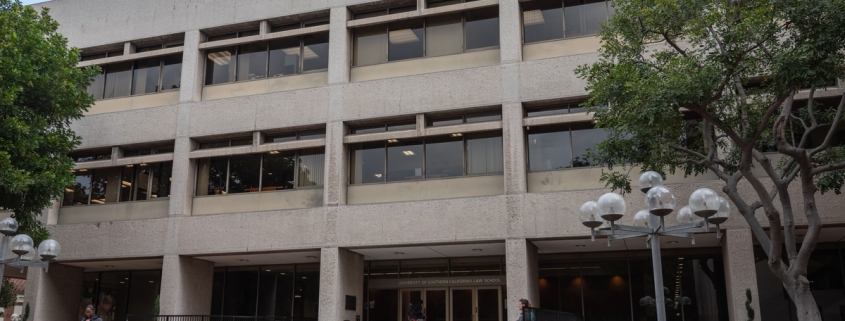Gould school offers new homeless advocacy class

The Gould School of Law is offering a new one-unit legal externship class that allows students to work with nonprofits that advocate on behalf of the homeless population.
Students have been placed at local public interest law firms including Los Angeles Homeless Services Authority and the L.A. County Public Defender’s office, where they will work with clients to hone their legal writing, oral advocacy and client interviewing skills.
“The course is designed to first kind of give them a kind of real-world exposure to the homelessness epidemic that we have in Los Angeles and across our country,” said James Gilliam, a Gould lecturer who is teaching the course.
Gilliam, who is also an attorney and coordinator at LAHSA, said his work with homelessness prevention inspired him to create the class. He hopes the experience will motivate students to pursue public interest law in the future.
“What I recognized really quickly [at LAHSA] is that we didn’t have enough lawyers available to clients,” Gilliam said. “Even more concerning is that it doesn’t look like there’s even enough lawyers in the pipeline for the need.”
Gilliam worked with Brenda Wiewel, director of the USC Initiative to Eliminate Homelessness, and Laura Riley, Gould director of experiential learning, to design the externship program.
According to an L.A. County report, the number of people experiencing homelessness increased 12% over the last year, totaling 59,000 people countywide. Riley believes the firsthand experience working with homeless clients will be impactful for participating students.
“I thought students might be interested in looking at this as a lens by which to experience their externship more impactfully, being able to look at policy issues, getting to look at the individual effects of homelessness and seeing how our city is sort of uniquely addressing the issue and what still needs to be done,” Riley said.
In addition to work in the field, students will share their experiences at different firms once a week during class. Riley said he believes this reflective portion of the class is crucial for each student’s individual development.
“Some students are directly working with people experiencing homelessness, some are more tangentially working with that issue,” Riley said. “So it’ll be interesting, I think, for them to have that reflection learning process.”
Gilliam designed the class as an opportunity for students to witness the legal obstacles people experiencing homelessness face in securing housing and to understand how lawyers can tackle those barriers. These obstacles include outstanding debt and prior convictions, which can be expunged with legal assistance.
“I really want them to do a full — what I call legal services — analysis of the family,” Gilliam said. “The goal is to prevent paying any money they don’t need to pay or shouldn’t be paying and to maximize the income that’s coming into the family.”
Gilliam also hopes students will begin to consider service gaps in the legal system and how lawyers can improve advocacy for the homeless.
“I’m excited to have the students take a macro look at the system and make potential suggestions for improvements by the end of the semester,” Gilliam said.
Students will also develop policy analysis skills of current legislation that may further stymie homelessness.
“There are a number of changes to state and local law that would make either drivers of homelessness reduced or establishing rights for people experiencing homelessness,” Gilliam said.
Riley said the legal externship will cover other special topics in the future depending on student interest. Currently, students have expressed interest in entertainment law.
Trojan Shelter Director of Media Matthew Lee supports the new class and its goal to help underserved groups.
“When we look at underrepresented communities, one of the biggest things that really doesn’t help them is that they don’t actually have a lot of experience or knowledge in the field of law,” Lee said. “They’re underrepresented, and they don’t have the allies or the knowledge or the legal agency that they need in order to get out of these bad situations.”

